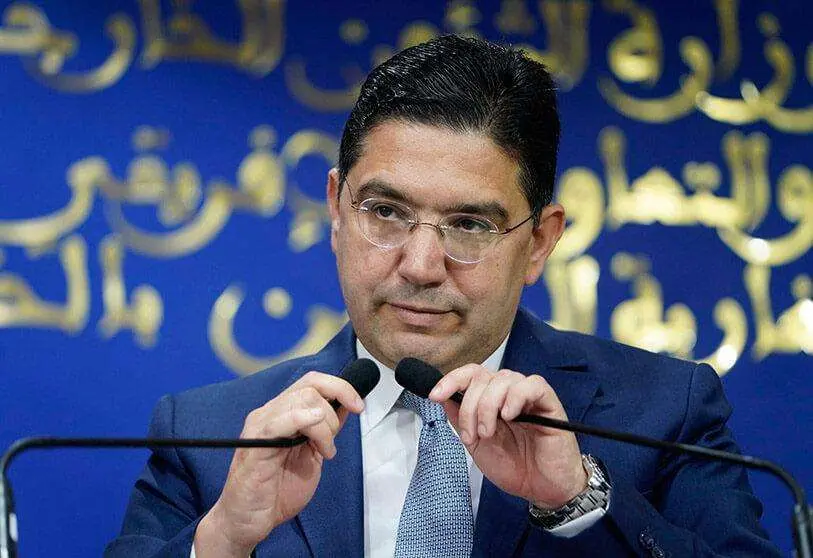Marruecos endurece su retórica contra Irán por armar al Frente Polisario

The head of Moroccan diplomacy, Nasser Bourita, interprets the geopolitical context like few others. The Foreign Minister took advantage of a joint press conference with his Yemeni counterpart to reinforce Morocco's external posture. "The world knows a lot about Iran's nuclear activities, but Iran is also working through intermediaries to destabilise North and West Africa," said Bourita, who came down hard on the Islamic Republic for arming extremist groups in the Middle East and the Maghreb, including the Polisario Front.
The diplomat emphasised the alleged military and arms support that Tehran has been offering for decades to the Sahrawi independence group, a support that Morocco claims to be aware of. According to Rabat, assistance is coordinated through the Iranian embassy in Algiers. But, as analyst Mariam El Atouabi reminds the Atlantic Council, the Alawi kingdom "has yet to provide visual evidence to corroborate its claims". "In any case, these may not be entirely unfounded, given Iran's growing ambitions in the region".
Morocco has no doubt that links between the Polisario Front and Tehran exist and are fluid. Bourita insisted that the support is not limited to a political level, but also and above all at a military level. The Islamic Revolutionary Guard (IRGC), a parallel state in Iran that operates as a nexus between the Persian leadership and its regional militias, trains, equips and supplies high-tech equipment, especially drones, to the Polisario, Rabat claims. Iranian-made drones are being used by Russia in its invasion of Ukraine.

Bourita's statements came in response to the provocative intervention in Mauritania by the Minister of the Interior of the self-styled Sahrawi Arab Democratic Republic (SADR) and member of the Polisario Front's political bureau, Omar Mansour. The President of the Sahel-Saharan country, Mohamed Ould Ghazouani, received a delegation of the group headed by Mansour himself in Nouakchott last week. From there, the former Polisario representative in France assured that drones would be used in a new offensive against Moroccan forces in the near future.
"The issue of non-governmental armed actors, including the Polisario, has become a phenomenon that poses a threat to regional and international peace and security, considering that the access of these actors to weapons and advanced technologies is very dangerous," Bourita declared after meeting in Rabat with the Yemeni Foreign Minister, Ahmed Awad bin Mubarak. "The countries that allow them to have these weapons must take full responsibility," he added, referring to Iran's provision of arms to the Sahrawi independence group and other like-minded militias such as Hezbollah.

Iran's response was swift. Persian Foreign Ministry spokesman Nasser Kanaani flatly rejected Bourita's accusations. "Instead of playing the blame game and making baseless accusations against the Islamic Republic of Iran, it would be better to worry about and take responsibility for the insecurity that threatens the countries and nations of the region due to normalisation with the Zionist apartheid regime," he remarked, referring to the fluid relations between Morocco and Israel, with which it signed an unprecedented military cooperation agreement almost a year ago.
Iran's support for the Polisario Front has been visible in the UN framework. The counsellor of the Iranian Permanent Mission to the UN, Mohammad Reza Sahraei, reiterated in March that Tehran advocated defending "the right to self-determination of the Sahrawi people" and demanded that Morocco put an end to "human rights violations in the occupied areas".
Bourita was categorical. "The Arab League committee in charge of limiting Iranian interference was clear that Iran is now the official sponsor of separatism and terrorism in our region, unfortunately this is done with a certain complicity," he said on Monday.

The hardening of Rabat's stance coincides with an international outpouring of criticism against Iran following the death in police custody of 22-year-old Kurdish woman Mahsa Amini, who was arrested by the morality police for allegedly wearing the veil incorrectly. Two weeks of mass demonstrations in Iran have already put the regime on the ropes.
The worsening of Iranian-Moroccan relations also coincides with the stalling of negotiations to resume the Joint Comprehensive Plan of Action (JCPOA), the 2015 nuclear agreement that limited Iran's nuclear programme. At the moment, the signing seems distant, almost impossible, the opposite of just a few weeks ago, when expectations were high even in Brussels. But the security forces' heavy repression of demonstrators has dynamited the bridges between the signatories, among whom Morocco has strong allies.
Relations between Iran and Morocco have, in fact, never been worse. In 2018, Rabat decided to sever diplomatic ties with Tehran following the internal publication of an intelligence report revealing the military assistance network provided to the Polisario Front by Tehran through Kassim Tajideen, a Lebanese businessman linked to Hezbollah. This was by no means the first time relations had suffered. In 2009, Rabat did the same after accusing Iran of propagating Shiism in Morocco, although relations were gradually restored.









